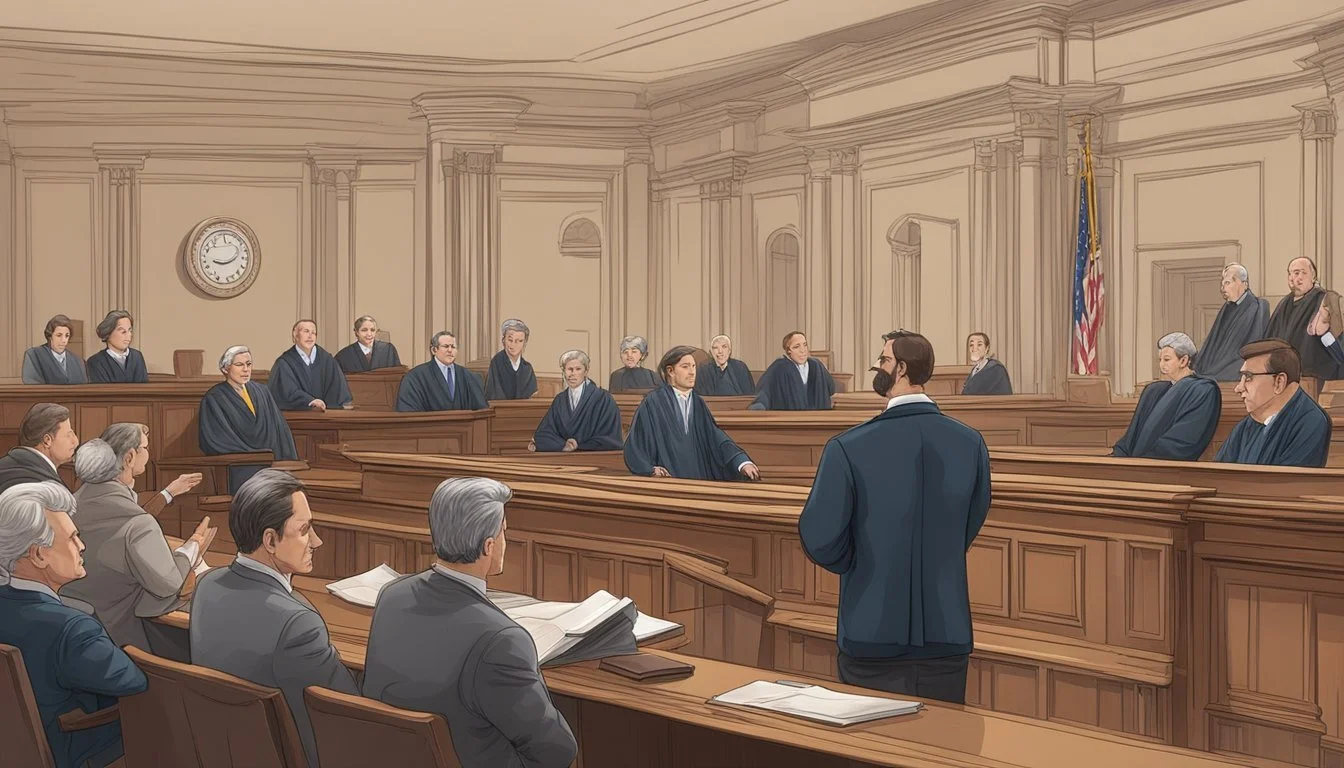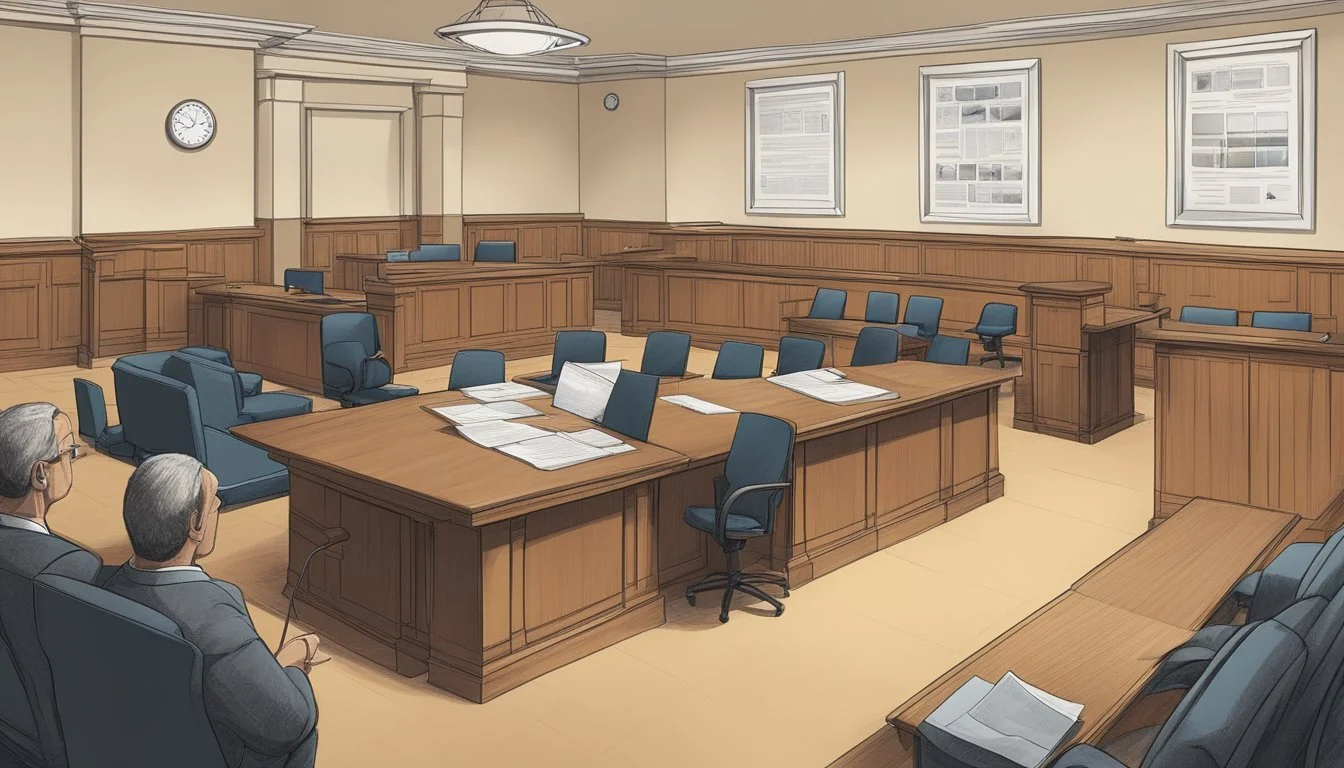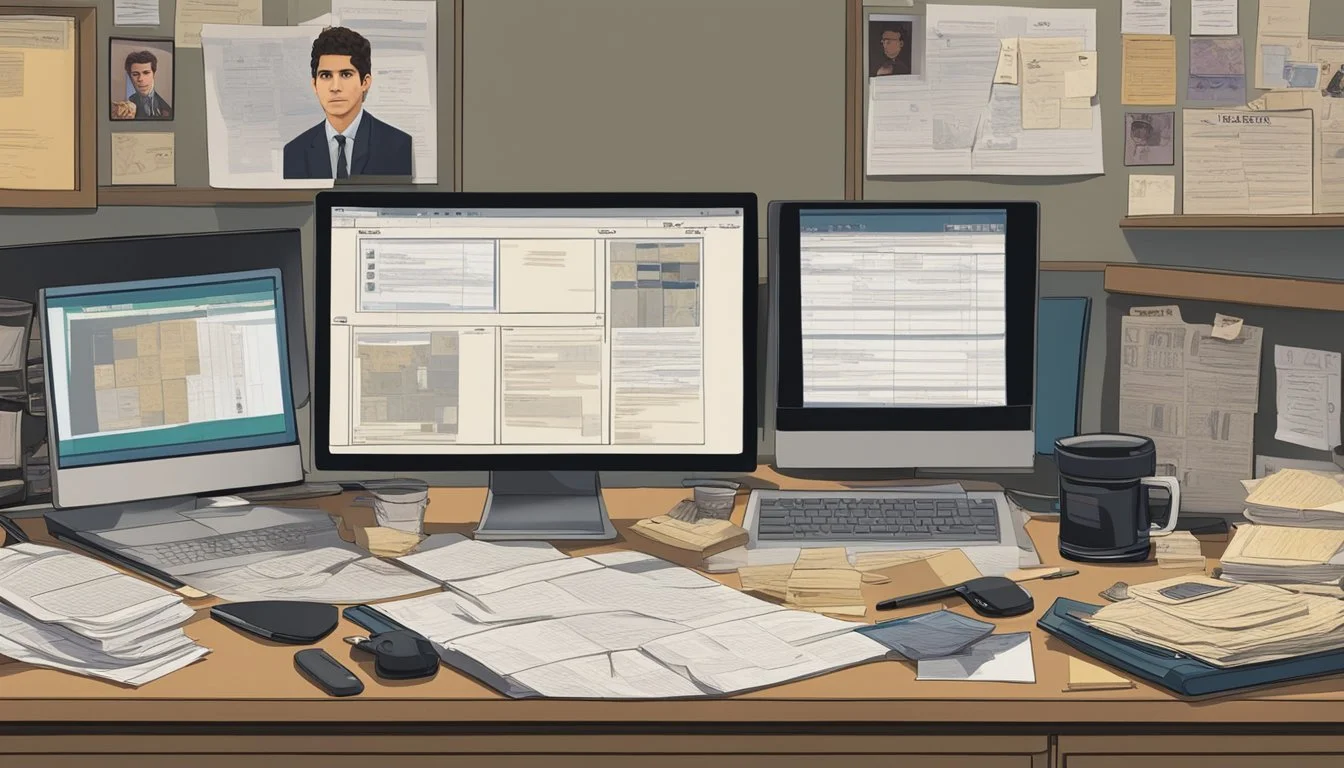Criminal Profiling Evolution: Lessons Learned from the Menendez Brothers
Advancing Forensic Psychology
The Menendez brothers case captivated the nation in the early 1990s, shedding light on the complex field of criminal profiling. Erik and Lyle Menendez were convicted of murdering their wealthy parents in their Beverly Hills mansion in 1989. The case highlighted the evolving nature of criminal profiling techniques and their application in high-profile trials.
The brothers' defense strategy, which included claims of sexual abuse, forced investigators and profilers to consider a broader range of motivations beyond financial gain. This shift in perspective led to more nuanced approaches in understanding the psychological factors behind familial homicides.
The ongoing public fascination with the Menendez brothers has prompted recent reviews of the case. This renewed interest demonstrates how criminal profiling continues to evolve, incorporating new evidence and changing societal attitudes towards issues like abuse and trauma in evaluating criminal behavior.
Historical Context
The Menendez brothers case captivated the nation, unfolding against a backdrop of wealth, family dysfunction, and shocking violence. This high-profile crime exposed deep-seated issues within the Menendez family and challenged assumptions about privilege and justice.
Menendez Family Background
Jose Menendez, a Cuban immigrant, built a successful entertainment industry career. He married Kitty Andersen, and the couple had two sons, Lyle and Erik. The family lived in a luxurious Beverly Hills mansion, projecting an image of affluence and success.
Jose was known for his demanding nature and high expectations for his sons. Kitty struggled with depression and substance abuse. Despite their outward appearance of prosperity, the family dynamic was complex and troubled.
The brothers later claimed they suffered years of physical, emotional, and sexual abuse at the hands of their parents, particularly their father.
Notorious Crime and Immediate Aftermath
On August 20, 1989, Lyle and Erik Menendez brutally murdered their parents in their Beverly Hills home. The crime scene was gruesome, with Jose and Kitty shot multiple times at close range.
Initially, the brothers claimed they were out at the movies during the killings. They spent lavishly in the months following the murders, raising suspicions.
Beverly Hills police investigated for months before arresting the brothers in March 1990. The case quickly gained national attention due to its shocking nature and the family's high-profile status.
Prosecutors charged Lyle and Erik with first-degree murder, setting the stage for a sensational trial that would captivate the public and challenge the legal system.
Criminal Investigations
The Menendez brothers case showcased critical elements of criminal investigations, including evidence gathering and the role of recorded confessions. These aspects significantly shaped the prosecution's approach and the eventual outcome of the trials.
Initial Evidence and Arrests
Police discovered Jose and Kitty Menendez shot to death in their Beverly Hills mansion on August 20, 1989. The crime scene revealed no signs of forced entry, raising suspicions about the perpetrators. Investigators initially considered robbery as a motive but soon shifted focus to the Menendez brothers.
Lyle and Erik's lavish spending spree following their parents' deaths drew attention. The brothers purchased expensive cars, watches, and even a restaurant. This behavior, coupled with inconsistencies in their alibis, led to increased scrutiny from law enforcement.
The Los Angeles County District Attorney's office built a case against the brothers over several months. On March 8, 1990, police arrested Lyle Menendez. Erik, who was out of the country, surrendered upon his return three days later.
Role of Tape Recordings and Screenplay
A pivotal moment in the investigation came when the brothers' therapist, Dr. Jerome Oziel, contacted police. Dr. Oziel had recorded therapy sessions in which Lyle and Erik allegedly confessed to the murders. These tape recordings became crucial evidence for the prosecution.
The therapist's girlfriend, Judalon Smyth, played a significant role by informing authorities about the existence of these tapes. Despite legal challenges regarding patient-therapist confidentiality, portions of the recordings were ultimately deemed admissible in court.
Another intriguing piece of evidence emerged: a screenplay Erik had written before the murders. The script depicted a son killing his parents for their inheritance, eerily mirroring the real-life events. Prosecutors used this screenplay to suggest premeditation and motive.
Court Proceedings
The Menendez brothers' case involved complex legal proceedings spanning multiple trials. These court events showcased evolving strategies and critical turning points in the prosecution and defense approaches.
First Trial and Mistrial
The initial trial began in 1993, with separate juries for each brother. The defense presented evidence of alleged sexual abuse by Jose Menendez. This strategy aimed to justify the killings as self-defense.
Both juries deadlocked in January 1994, unable to reach a verdict. The split opinions reflected the case's complexity and public intrigue.
Prosecutors faced challenges in countering the abuse claims. The mistrial prompted reassessment of tactics for future proceedings.
Retrial and Sentencing
A retrial commenced in October 1995 with a single jury. Prosecutors adopted a more aggressive approach, limiting abuse evidence.
The defense struggled to maintain their prior narrative. In March 1996, the jury found Lyle and Erik Menendez guilty of first-degree murder.
The brothers received life sentences without parole in July 1996. This verdict marked a significant shift from the previous trial's outcome.
The Los Angeles District Attorney's office secured a conviction after years of legal battles. The case highlighted evolving perspectives on family dynamics and criminal motivations.
Subsequent Legal Developments
The Menendez brothers' case has seen significant legal developments since their initial conviction. These include attempts to overturn the verdict and recent efforts to reconsider their sentences.
Appeals and Habeas Corpus Petitions
Lyle and Erik Menendez pursued multiple appeals after their 1996 conviction. They filed habeas corpus petitions, challenging the constitutionality of their detention. The brothers argued that their original trial was flawed due to ineffective counsel and excluded evidence.
Their appeals were consistently denied by higher courts. The California Supreme Court rejected their petitions, upholding the life sentences without parole.
Despite setbacks, the Menendez brothers continued to seek legal remedies from Richard J. Donovan Correctional Facility, where they are incarcerated.
Efforts Toward Resentencing
In recent years, there have been renewed efforts to reconsider the Menendez brothers' sentences. Los Angeles County District Attorney George Gascón announced a review of new evidence in the case in 2023.
This development sparked discussions about potential resentencing. Advocates argue that the brothers have shown rehabilitation during their time in prison.
The possibility of parole remains a contentious issue. Supporters claim the Menendez brothers deserve a chance at release, while others maintain that their life sentences should stand.
Prison reform debates have also influenced these discussions, raising questions about appropriate punishment and opportunities for redemption in the criminal justice system.
Media and Public Perception
The Menendez brothers case became a media sensation, shaping public opinion through various forms of coverage. Television, print media, and later streaming platforms played crucial roles in how the public viewed Lyle and Erik Menendez.
Dominick Dunne and the Power of the Press
Dominick Dunne, a prominent journalist and writer, significantly influenced public perception of the Menendez case. His coverage for Vanity Fair magazine brought the trial into the national spotlight. Dunne's detailed accounts and analysis of courtroom proceedings captivated readers across the country.
His writing style, which blended factual reporting with social commentary, painted a vivid picture of the wealthy Menendez family and the brothers' alleged motives. Dunne's work often focused on the intersection of crime, wealth, and society, making the Menendez case a perfect subject for his storytelling approach.
Influence of Documentaries and Dramas
Documentaries and dramatized retellings have kept the Menendez case in the public eye for decades. NBC News produced several specials that examined the brothers' claims and trial proceedings. These programs often presented new evidence or perspectives, reigniting public interest in the case.
In recent years, streaming platforms like Netflix have created series such as "Monsters: The Lyle and Erik Menendez Story." These productions blend factual events with dramatic storytelling, potentially swaying public opinion. Ryan Murphy's work on the case has also garnered attention, bringing a new generation of viewers to the story.
Docuseries have delved into the psychological aspects of the case, exploring the brothers' claims of abuse. These in-depth examinations have led some viewers to reassess their opinions on the Menendez brothers' guilt and the justice system's handling of their case.
Personal Lives and Public Interest
The Menendez brothers' case continues to captivate public attention decades after their conviction. Their lives in prison and renewed interest in their story have brought fresh perspectives to their troubled past.
Menendez Brothers in Prison
Lyle and Erik Menendez have been incarcerated since 1996. Initially separated, they were reunited at Richard J. Donovan Correctional Facility in San Diego in 2018. The brothers have shown signs of rehabilitation, participating in prison programs and maintaining connections with supporters.
Erik married Tammi Saccoman in 1999, while Lyle has been married twice during his imprisonment. Both brothers have expressed remorse for their actions and have worked to address their trauma through therapy and self-reflection.
Renewed Interest in the Case
Social media platforms, particularly TikTok, have sparked a resurgence of interest in the Menendez case. Young users have shared videos sympathizing with the brothers' abuse claims, leading to broader discussions about trauma and justice.
Celebrity involvement, including Kim Kardashian's advocacy, has further amplified public attention. A 2023 Netflix documentary allowed the brothers to share their perspectives, reigniting debates about their motivations and the fairness of their sentences.
New testimonies, such as that of former Menudo member Roy Roselló, have emerged, supporting the brothers' abuse allegations and prompting calls for a re-examination of the case.
Analysis and Interpretations
The Menendez brothers case sparked significant advancements in criminal profiling and shaped legal strategies. These developments continue to influence modern forensic psychology and courtroom proceedings.
Criminal Profiling Advancements
Forensic psychology evolved rapidly following the Menendez trial. Experts refined techniques for assessing trauma and its impact on behavior. Psychological profiling became more nuanced, considering family dynamics and potential abuse.
New methods emerged for evaluating claims of sexual abuse. Psychologists developed improved protocols for interviewing victims and analyzing long-term effects. This led to more accurate assessments in similar cases.
Criminal profilers now place greater emphasis on motive analysis. They examine family histories, relationships, and potential traumas more thoroughly. This holistic approach provides deeper insights into complex familial murder cases.
Lessons from the Menendez Brothers' Trial
The trial highlighted the importance of thorough crime scene analysis. Investigators now pay closer attention to evidence that might support or refute abuse claims. This includes examining family records, interviewing associates, and analyzing patterns of behavior.
Defense strategies evolved, with attorneys learning to present psychological evidence more effectively. They now work closely with mental health experts to build compelling narratives around trauma and its consequences.
Prosecutors adapted by focusing on motive and challenging abuse allegations more rigorously. They learned to counter psychological defenses with their own expert witnesses and evidence. This has led to more balanced courtroom debates on the role of past trauma in violent crimes.
Implications for Modern Justice
The Menendez brothers' case highlighted key issues in the justice system, including mental health considerations and the influence of wealth on legal outcomes. These factors continue to shape criminal proceedings and debates on equitable justice today.
The Role of Mental Health in Legal Defenses
Mental health has become increasingly central in criminal defense strategies. The Menendez trial brought attention to trauma and abuse as potential mitigating factors. Courts now more frequently consider psychological evaluations and expert testimony from therapists. This shift has led to debates on the extent to which mental health should influence sentencing.
Some argue that acknowledging trauma promotes rehabilitation, while others worry it may excuse criminal behavior. The justice system now grapples with balancing punishment and treatment for offenders with mental health issues. This has sparked discussions on alternative sentencing options and specialized mental health courts.
The Intersection of Wealth, Crime, and Punishment
The Menendez case exposed disparities in legal representation based on financial resources. Wealthy defendants often secure top-tier lawyers and expert witnesses, potentially influencing trial outcomes. This advantage has led to calls for reforms to ensure equal access to justice.
Critics argue that lavish spending on legal defense teams can overshadow the pursuit of truth. The brothers' ability to hire prominent attorneys and present a complex defense strategy highlighted this issue. As a result, there's growing scrutiny on how wealth impacts criminal proceedings and sentencing.
Some jurisdictions have implemented measures to address these concerns, such as improved public defender systems and limits on expert witness fees. The ongoing challenge is to create a more level playing field in high-profile cases involving multimillion-dollar estates.








